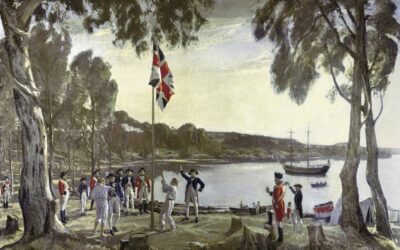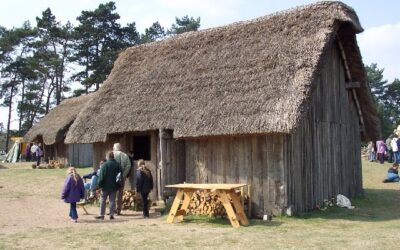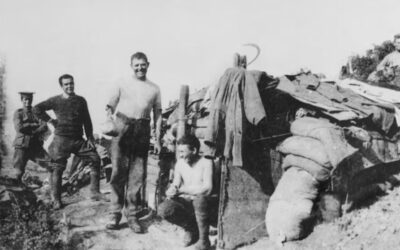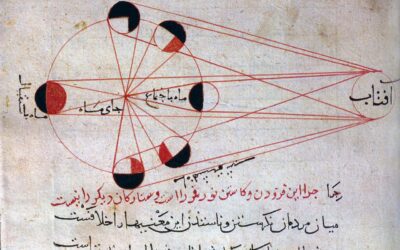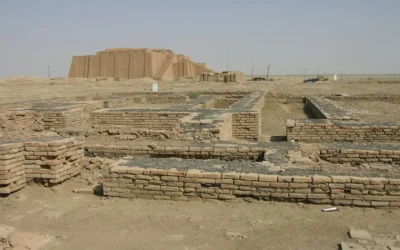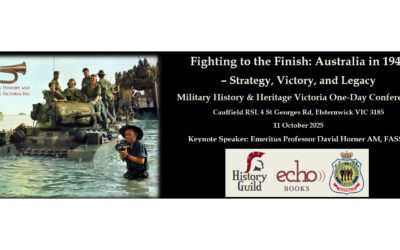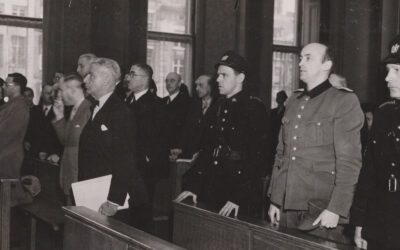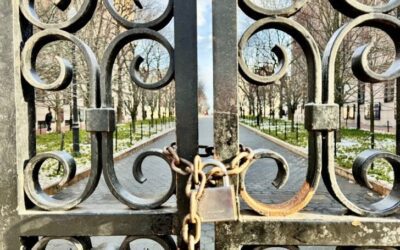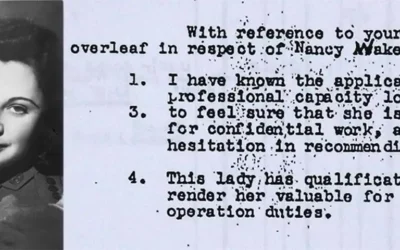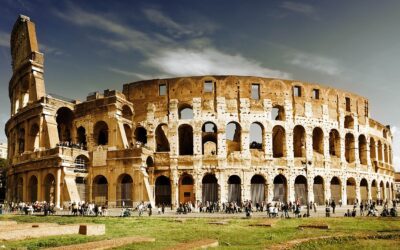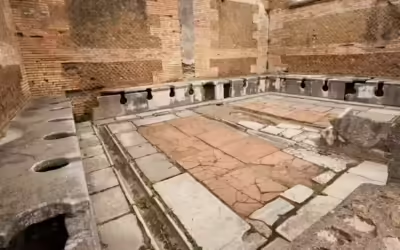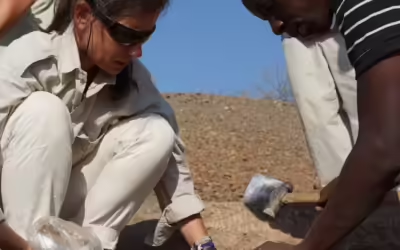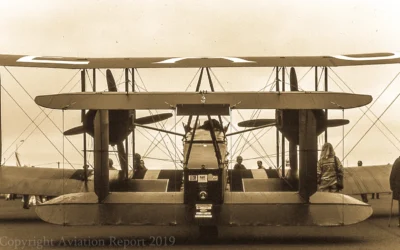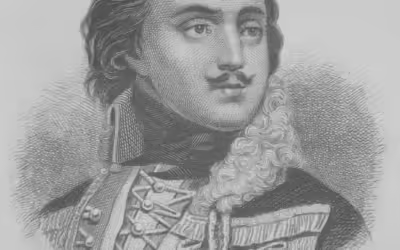History Guild publishes articles that provide interesting insights into history. We cover all aspects of history, from around the world and across time.
From Captain Cook to the First Fleet: how Botany Bay was chosen over Africa as a new British penal colony
Reading time: 7 minutes
After Captain Cook’s Endeavour voyage in 1770, the east coast of Australia was drawn on European maps of the globe for the first time. Yet, in terms of European contact with the continent, there was an 18-year lull in between Cook’s 1770 landings and the arrival of the First Fleet in 1788.
Love Thy Neighbour: The Importance of Guest Rights in Medieval England
Reading time: 7 minutes
In almost every country in the modern world, although some more than others, various institutions, laws and social norms protect travellers. Yet the institutions such as the courts and the government, or the enforcing bodies such as the police, have not always existed.
How the Great War shaped the foundations of Australia’s future
Reading time: 9 minutes
It is striking that 2015 is the 110th anniversary of the Gallipoli offensive, the 80th anniversary of end of the Second World War in the Pacific, and the 50th anniversary of the end of the Vietnam War. This is a good time to reflect not only on the actions of those wars, but on their consequences and their enduring legacies.
The Incredible Career of Mercenary Bob Denard, Viceroy of the Comoros
Reading time: 14 minutes Bob Denard had not quite reached his 32nd birthday when a newspaper article caught his eye. It was a profile on the foreign mercenaries fighting for Moïse Tshombe’s breakaway state, Katanga, in southern Congo, and it contained a photograph of...
Why history instruction is critical for combating online misinformation
Reading time: 6 minutes
Can you tell fact from fiction online? In a digital world, few questions are more important or more challenging. For years, some commentators have called for K-12 teachers to take on fake news, media literacy, or online misinformation by doubling down on critical thinking. This push for schools to do a better job preparing young people to differentiate between low- and high-quality information often focuses on social studies classes.
New evidence from West Papua offers fresh clues about how and when humans first moved into the Pacific
Reading time: 6 minutes
Charting the archaeology of West Papua is vital because it helps us understand where the ancestors of the wider Pacific came from and how they adapted to living in this new and unfamiliar sea of islands.
World War I in Broken Hill: a Turkish-Inspired Attack on Australia’s Home Soil
Reading time: 14 minutes From August 1914 to November 1918, over 416,000 men served in Australian forces fighting the First World War, in theatres ranging from the Pacific to the Middle East and France. 60,000 died far from home in battles fought thousands of miles...
Confessions from the Cambridge Five: a file release from MI5
Reading time: 7 minutes
Over 100 Security Service (MI5) files are being released today covering a wide range of subjects and individuals. Most notably, the files offer fresh perspectives on notorious members of the Cambridge Five spy ring, namely Anthony Blunt, Kim Philby and John Cairncross.
Changing the Eurocentric narrative about the history of science – why multiculturalism matters
Reading time: 6 minutes
There is nothing more intimately personal than the thoughts in your head, and yet you did not conceive them. They are a continuation of knowledge and ideas that for thousands of years have travelled the globe, shaped by countless minds from all civilizations. In a time of seemingly growing division, that is a thought that ought to bring us all together.
The world’s first museum was curated by a princess. A tour reveals the origins of the zodiac, calculus and writing
Reading time: 6 minutes
Around 2,500 years ago, a princess living in what is now modern-day Iraq collected a number of artefacts, including a statue, a boundary stone and a mace head. The items, which show signs of preservation, date from around 2100 BCE to 600 BCE. This collection, it is generally thought, was the world’s first known “museum”.
Full Program Announced! Fighting to the Finish: Australia in 1945 – Strategy, Victory and Legacy Conference, Melbourne. Book Now.
Military History & Heritage Victoria is excited to announce that tickets are now on sale for our next conference – Fighting to the Finish: Australia in 1945 – Strategy, Victory and Legacy – which will be held on 11th October 2025 in Melbourne. History Guild is...
How opening an archive caused consternation in the Netherlands
Reading time: 1 minute Generally speaking, making an archive accessible to the public isn't something covered by the national news. However, in the Netherlands a massive public debate was sparked when an archive with the files of over 400.000 people suspected of...
Wars of the Roses: how the French meddled in this very English conflict
Reading time: 6 minutes
The Wars of the Roses are normally portrayed as a series of battles between two warring houses, York and Lancaster, over who was rightly king of England. However, they were about much more than that. In many ways, the wars were really about standards of government.
Open Letter to the Prime Minister: Restoring Equity in Higher Education
Reading time: 10 minutes The following Open Letter was sent by the Australian Historical Association to the Prime Minister of Australia. History Guild strongly agrees with it's sentiments. If you would like to support this campaign you can sign a petition here. We...
The story of Nancy Wake
Reading time: 7 minutes
Nancy Wake (1912–2011) was an agent for the Special Operations Executive and the most wanted woman in France during the Second World War. Dubbed the ‘White Mouse’ by the Nazis, she was the one who always got away.
Rome’s Greatest Technological Developments
Reading time: 7 minutes
Rome.
The capital city of modern day Italy, and one of the most famous, successful and longest-lasting empires to ever exist on planet Earth.
The Romans, both in the eras of the Roman Republic and the Empire, had a knack for stealing, adapting, and improving upon technologies, tactics, and ideas they encountered from other cultures – often those they fought, ranging from the Etruscans to the Greeks and Persians.
The sources of Russian conduct
Reading time: 14 minutes
This essay examines the sources of Russian power and conduct from an historical, cultural and geopolitical perspective. It aims to help assessment of Russia’s future behaviour. My approach is based on the essay The Sources of Soviet Conduct written by the famous US State Department diplomat and leading Russian expert George Kennan (under the pseudonym ‘X’) in the journal Foreign Affairs in 1947. Kennan was struggling to get Washington to understand the threat from the Soviet Union so soon after the end of World War II, when the USSR had been an ally of the United States.
A Belgian farmer moved a rock and accidentally annexed France: the weird and wonderful history of man-made borders
Reading time: 5 minutes
Nations establish their borders through treaties. Rivers are sometimes relied on to set boundaries, but even here tensions rise when there are disputes about interpretation. Is the boundary on the river banks, the deepest part of the river, or the very centre of the flow?
Talking heads: what toilets and sewers tell us about ancient Roman sanitation
Reading time: 9 minutes
Focusing on life in ancient Rome, Pompeii, Herculaneum and Ostia, I’m deeply impressed by the brilliant engineers who designed these underground marvels and the magnificent architecture that masks their functional purpose. Sewer galleries didn’t run under every street, nor service every area. But in some cities, including Rome itself, the length and breadth of the main sewer, the Cloaca Maxima, rivals the extent of the main sewer lines in many of today’s cities. We shouldn’t assume, though, that Roman toilets, sewers and water systems were constructed with our same modern sanitary goals in mind.
The World’s Sweet Tooth: A Brief History of Chocolate
Reading time: 6 minutes
It’s hard to imagine the modern Western world without chocolate. Whether it’s a treat on the weekend, or as a gift for Christmas or Valentines’, chocolate has become one of those foods that feels like it must’ve been around forever.
Yet the sweet chocolate bars we know and love today are surprisingly new, historically speaking.
Our stone tool discovery pushes back the archaeological record by 700,000 years
Reading time: 8 minutes
We, and the West Turkana Archaeological Project which we co-lead, had discovered the earliest stone artifacts yet found, dating to 3.3 million years ago. The discovery of the site, named Lomekwi 3, instantly pushed back the beginning of the archaeological record by 700,000 years. That’s over a quarter of humanity’s previously known material cultural history. These tools were made as much as a million years before the earliest known fossils attributed to our own genus, Homo.
On a Wing and a Prayer – Vimy to Australia 1919-2019
Reading time: 4 minutes On this day 100 years ago, G-EAOU, a converted World War I Vickers FB.27 Vimy Bomber, landed in Darwin at the conclusion of a stunning international flight, the first England-Australia flight and the world’s longest flight to date, in the Great...
Adventurous identities: intersex soldiers and cross-dressing women at war
Reading time: 4 minutes
Pulaski is a hero of the struggles for Polish and American independence. He is credited with saving George Washington’s life in battle and with establishing the first American cavalry force. According to the documentary, DNA testing has confirmed a female-appearing skeleton is indeed Pulaski’s. This new evidence is the first hint that Pulaski – who seems to have lived as male from childhood – was anything other than a cisgendered man.
Five Conspiracies that shaped our world
Reading time: 7 minutes
The world is a complicated place, and there are a lot of things out of our control. No wonder, then, that conspiracy theories abound, tales where shadowy forces control what happens, when it happens, and to whom. However, not all of these theories are all that theoretical, and there are plenty of examples of conspiracies that went far beyond the drawing board.

